Tito Gobbi Interview with Bruce Duffie . . . . . . (original) (raw)
Baritone Tito GobbiA Conversation with Bruce Duffie
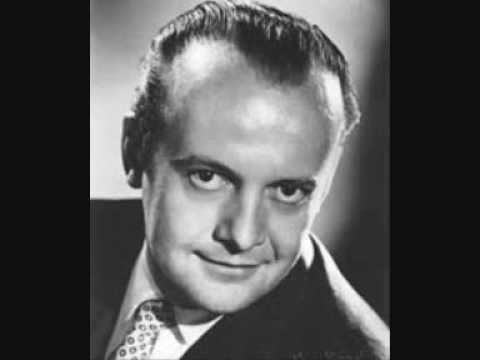
Tito Gobbi was an admired operatic baritone. He originally studied at Padua University for a career in law, but he eventually gave that up in favor of pursuing voice lessons in Rome with Giulio Crimi. He made his operatic debut in the town of Gubbio in 1935, as Count Rodolfo in Bellini's "La sonnambula." He was hired at Milan's La Scala for the 1935-1936 season as an understudy; his first appearance there was as the Herald in Ildebrando Pizzetti's "Oreseolo."
He won the international singing competition in Vienna in 1936. As a result he began getting improved billing; he sang the role of Germont in "La traviata" at the Teatro Reale in Rome in 1937. In the same year he sang Lelio in Ermanno Wolf-Ferrari's "Le donne curiose," and continued singing secondary roles through 1939 there. He was promoted to primary roles and in 1941 sang Ford in Verdi's "Falstaff" during a visit by the company to Berlin in 1941. Meanwhile, in a guest appearance at Rieti he first sang the role of Scarpia in Puccini's "Tosca" in 1940. This was to become his best-known part.
Gobbi made his La Scala debut in a major role in 1942 as Belcore in "L'Elisir d'Amore." However, the performance that made him famous was as Wozzeck in the first Italian performance of Alban Berg's opera in Rome in November, 1942. Fighting raged throughout Italy following the Allied invasions there in 1943, interrupting his career. After the war he began to include international appearances. He first appeared in Stockholm in 1947 as Rigoletto; in 1948 he went to Covent Garden in concerts and to San Francisco to debut as Figaro in Rossini's "Barber of Seville." His London operatic debut was at Covent Garden as Belcore when the La Scala Company toured there. He appeared in Chicago in 1954 as Rossini's Figaro, and debuted at the Metropolitan Opera Company as Scarpia, January 13, 1956. He sang Don Giovanni in Salzburg in 1952 under von Karajan's direction.
He took up producing as well, often at Chicago, where he made regular appearances, and producing opera became an ever more important part of his career after 1965, which is when he produced a performance starring himself in the title role of Verdi's "Simon Boccanegra" in London.
Although he was particularly well known for his portrayal of Verdi's baritone roles (including Posa in "Don Carlos"), and of Puccini's (Scarpia, Jack Rance, Gianni Schicchi), he had a very large repertory of well over 100 roles, including such rare operas as Malipiero's "Ecuba" (as Ulysses), Teprulov in Rocca's "Monte Ivnor," the Count of Albaforita in Persico's "La locandiera," and operas by Lualdi, Napoli, and Ghedini. He was an excellent actor, had a high degree of musicianship and intelligence, had a flexible, rich, but not large baritone voice, and was at home in a wide variety of parts. He also appeared in 26 movies. He was the brother-in-law of another eminent singer, Boris Christoff. Gobbi retired from the operatic stage in 1979. He published an autobiography (Tito Gobbi: My Life, 1979) and Tito Gobbi and His World of Italian Opera (1984). He left a significant legacy of recorded performances, mainly made in the 1950s and 1960s. ~ Joseph Stevenson, Rovi
It is not often that one has the opportunity to meet a living legend, but in the fall of 1982, Tito Gobbi returned to Chicago and we set up an appointment. He was back in the Windy City, the site of many performances as leading artist and stage director (as shown in the chart at the bottom of this webpage), to oversee the opera with which he was perhaps most closely associated, Tosca
.
We spoke of many aspects of his career, and he was forthcoming with thoughts and opinions. He seemed to relish the stature he had earned, but was in no way haughty or condescending about anything. His English was quite good, and was (understandably) sprinkled with Italianate mannerisms, odd tenses, and a few charming turns of phrase. Some of the grammatical errors have been fixed, but a number of quaint usages have been left intact.
At times, I played Devil's Advocate when prodding him about circumstances, and he understood that my sympathies were usually with his views and conclusions. He was imposing but genial, firm but gentle, resolute but tranquil. He often tapped his cane on the floor to emphasize a point, and made it clear that his ideas came from experience onstage, in films, and from making recordings.
Here is that conversation . . . . . . . . .
Bruce Duffie: You've had a very long and distinguished career; do you enjoy, now, directing and producing operas?
Tito Gobbi: Very much, because for me, it's like continuing my career, in a certain way. I'm still on stage, even if I don't sing. I try to help my colleagues to perform; I am mostly devoting my time to the Italian repertoire, in which I can say a little about the interpretation, especially interpretation of the words, the meaning of some words. I try to go a little deeper in the characterization of different personage. I enjoy it very much; it's a beautiful choice that I made already when I was singing, because I started 20 years ago to produce.
BD: Do you feel that the standards of operatic stage acting have improved over the last thirty or forty years?
TG: Enormously. There is a great improvement in acting, in interpretation, and also in makeup; in all the art which is visible, and also in the interpretation. A lot of singers today realize that we have to perform the play, the story, in a certain way with the voice. So the voice is not anymore the first and the most important thing. You must have a voice to become a singer, but if you want to become also a singing actor, then you must be an actor first.
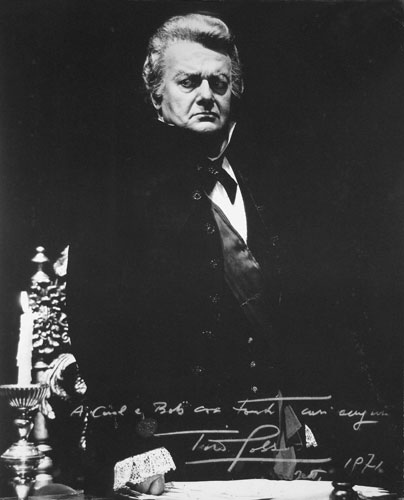 BD: Could some of these operas stand without the music, just as straight plays?
BD: Could some of these operas stand without the music, just as straight plays?
TG: I think yes; I think yes; You mean if we perform the opera without music, without singing?
BD: Right, just speak the lines as a drama.
TG: I think yes.
BD: Even the ones which were not originally plays?
TG: No, because the work I have been doing when I was singing was just this! I was first performing in the legitimate theater doing dramatic parts. Then I went to the music; it was much easier to learn the music after.
BD: When you're working with young singers, do you tell them first to learn the play and understand that aspect first?
TG: Yes. Oh, yes. It's important because when a young singer picks up a wrong interpretation, it is very difficult to cancel this. He will drop the corrected idea as soon as he's distracted or preoccupied by something, and he will go back to the mistake. But if he knows exactly what he is talking about, he will know how he has to express the character! He will understand what color of the voice he has to use. The palette of color in the voice is endless; there's no limit. So when he knows how to be happy, or to enjoy the part, how to smile, how to laugh or to cry, then it would be easy for him to transfer this on the singing voice.
BD: Does the size of the theater change your ideas about direction? Do you direct things differently if it's small, intimate theater or a great big, large theater?
TG: Certainly. In a large theater you have also bigger scenery; more steps from left to right. Everything in a small theater must be adapted to a small theater.
BD: When you are working in a large house, do you try to get the actors to play to the very back row of the theater to communicate the drama?
TG: I ask, always, for good projection because good projection means that if you are able to project the sound, the size of the house is not important anymore. You are reaching them all. To play on stage, upstage or center stage or in the front of the stage, they have to play where they are! A singer used to come to the front of the stage, sing the aria there and then turn for the applause. It is no longer the time for that kind of deportment.
BD: Do the singers today take what you give them and work with it?
TG: Yes. Yes, I must say I'm very pleased, very happy, and also satisfied working with my colleagues because they are listening to me with respect and consideration; they appreciate what I suggest.
BD: Is it perhaps easier to work with a singer with whom you did not sing on stage, as opposed to a singer with whom you had a relationship?
TG: No. I think it depends on the intelligence of the singer. When they are intelligent, as we have in here, for this cast of Tosca, they are all very clever, very intelligent as actors. In acting they want to learn, and they know I can give good suggestions, so they listen to me, and they take for granted what I suggest.
BD: Do you come with a preconceived idea, or do you work with what you have, and mold according to the talents that you have at hand?
TG: No, no; I must have my own idea. Then you have to adapt to the situation naturally.
BD: Do you like the ideas that scene designers have taken in the last 20 years?
TG: Yes. I am, in a certain way, a little bit conservative. I believe Tosca must be performed in the 1800s, because otherwise the Battle of Marengo would be out of place! Traviata can be played a little closer to us because it was a modern opera when it was first performed. But it must be always belong to the past; you can't accept the situation ofTraviata today. People will laugh. You have to respect the period in which they were been intended to be. There are operas that have no date; they are not as exact. There are some operas that you can change. But if you do Gianni Schicchi, for instance, it must be in Florence at that period because also the notary says, "In twelve hundred ninety-nine..."
BD: You wouldn't agree to update the whole thing and change the text appropriately?
TG: No. I don't like this kind of thing. I am really against this. I can improve by modernizing in a certain way the decor, the scenery; the costumes can be made lighter, made more concentrated by not too much detail. I remember once that I was just at the beginning of my studies, and I went to the Royal Opera House in Rome. When the curtain rose, I was fascinated by the decor. It was so beautiful, like a miniature in all the details; the little angel in gold, a little marble; everything was so finely made up that it was looking like an exhibit! And suddenly the curtain came down; I wasn't listening to the singers! So that was wrong! It was too much. [Taps cane on the floor for emphasis] Too much!
BD: So your attention was too much drawn to the detail!
TG: Too much stage! Too much scenery. Constantly the decor had been stealing my attention from the music. I had no experience at all at this time, but it was something which was wrong.
BD: Perhaps you should go twice; once to look at the scenery, and again to hear the singers!
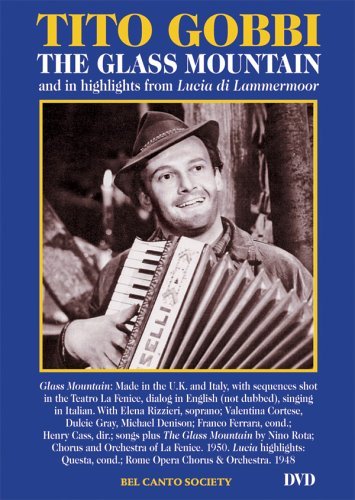 TG: Yes! [Both laugh] Maybe that's a good idea! But when the decor is too imposing, too much capturing the attention, it is against the music. First of all we have to serve the music.
TG: Yes! [Both laugh] Maybe that's a good idea! But when the decor is too imposing, too much capturing the attention, it is against the music. First of all we have to serve the music.
BD: Are you conscious of this, then, in your direction, not to call attention to the movements and to the action?
TG: Yes, certainly. As you know, I have also done many films; 26 films I have done, so I have learned what means the close-up. When a singer is singing something important, the attention must be on him. If you make other people moving up and down, and around, it will distract the audience. So that's focusing the attention on the actor or singer who is telling the story!
BD: Do you approve of opera in translation?
TG: No. Not at all.
BD: Never?
TG: Not at all. No, I don't like it because in all my life, no matter what else is happening, I have respect for the music and the composer of the music, and immediately after him comes the libretto. If you think about the composer of the music
— say Giuseppe Verdi — he wrote this music because these words, these phrases were inspiring him to write down these notes. Then in the translation to change it into another language, you have to change the place of the word. You can't change the place of the music, so it is wrong!
BD: But many times the composers themselves approve of translating their operas, to get them heard farther and wider.
TG: Yes. But I don't think they will be really very happy. They approve more for business than for art.
BD: Continuing with this idea, how much does the business end of opera affect your role as a director?
TG: The money, you mean? Nothing at all. I like to do it and I do a lot of things where I ask money; I am well paid for this and for that, but also, many times I do it for nothing. I have my place I enjoy working with these people.
BD: But if the opera house says to you, "We can only spend so much money on a production..."
TG: If the production is good, if they guarantee me the quality, I will accept. Certainly if they say, "We can't spend money," or "We don't give you any quality," I say, "Goodbye." I don't do it! [Both laugh] But when the cast is good, the orchestra is very good, or the chorus is excellent, et cetera, it would be a pleasure to do it; you don't pay attention really to how much you are going to earn. If it is enough to live, to pay the taxes, then it's good enough.
BD: Tell me a bit about your school.
TG: I had my school in Florence, and now I am going to do the same
— Studio dell'opera Italiana — in my hometown of Bassano del Grappa. Next year I start again; I have been teaching at Villa Schifanoia in Florence for 11 years. This year I couldn't; I was so busy I couldn't do it.
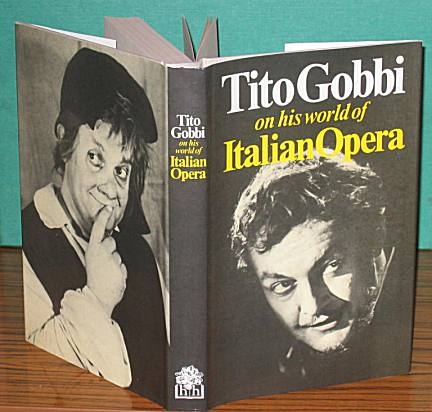 BD: Wasn't there a connection with Rosary College in suburban Chicago?
BD: Wasn't there a connection with Rosary College in suburban Chicago?
TG: Yes, with Rosary College. This is an example of how much is going on. So we finish this year, and unfortunately it's impossible to do it again. But the region of Veneto, in the north of Venice, asked me to do something similar under the protection of the government and the city of Bassano, my hometown, and the city of Asolo. You know the theater of Asolo made famous by Eleonora Duse? All the material from inside the theater was taken to Sarasota, Florida. The house is still there, and they have renovated and made it a new theater. So hopefully we will have a school in the Venetian villa. In the morning will be coaching; I will have five or six maestri for the students to study with, to get ready; in the afternoon we have class with me on the stage of the Teatro Eleonora Duse. But I do this for my pleasure; I don't receive money; I'm not paid for this. I pay my own expenses; I pay my food and my living. I do it for pleasure, because I was very happy in my career; I was very lucky, and it was a successful career, very successful.
BD: You're passing on Tito Gobbi to the next generations.
TG: Yes. It is an enormous treasure that I collected in 45 years of singing
— experience, knowledge, etc. It would be a nonsense to take this into the coffin when I take off! This is why I think it is good to give this as a present, as a help to the young generation so they can continue to carry on the good standard of the opera.
BD: Are the students today more prepared than they were some years ago?
TG: Yes. A great percentage of the students are much better prepared and cultured, and willing to do things. There is a great enthusiasm. Certainly there is also a big crisis in the financial difficulty in the theater all over the world, but I think this difficulty has been always there. Rossini used to say that the opera is finished! [Both laugh heartily] So it's still going after 200 years!
BD: Are you optimistic about the future of opera?
TG: Oh, yes. Music is in our soul. Even if you sit in the desert, as happened to me! Even in complete silence, I was surrounded by music because the music is in yourself. You feel it just like the air that you breathe. There is la musica del silenzio, the music of the silence, which is a beautiful music. It's like the pause in the orchestra when there is no music; it means a lot. You can never live without music or without art.
BD: Are we perhaps surrounded by too much music these days because of the electronics?
TG: For me, yes. I have a beautiful house in Roma; it is an old farm that we have adapted; it is two big houses, naturally in the Roman style, not skyscrapers. Besides the farmhouses there are four small silos, a little chapel and a swimming pool. There are also loudspeakers all over, because the architect who built the house put them in, but I never use them. I have no music at home; I don't want to have music. If you want music, you can put on a record when you like, or you can open the radio and you can listen. But to be surrounded 24 hours a day by music, I think it's like a drug; then you don't listen anymore. For me, in America it's a good companion when you go up in the lift alone; you go up to the 25th floor accompanied by a minuetto, or something. But when you go in the bathroom or when you go in the subway, everywhere you have this; it's a little too much for me. Maybe I am old-fashioned in this, but I like to have music when I like to have music; I like to have a drink when I am thirsty; I like to have soup when I am hungry. But to give an example, if, in substitution of the music that is now surrounding us, we had the smell of soup. Suppose that for 24 hours I surround you in a perfume of good cooking from the kitchen. It would be disturbing your stomach and your head! So for me music, when it's so much, I don't enjoy anymore.
BD: Did you enjoy making recordings?
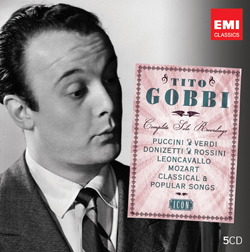 TG: [Pausing to muse a moment] Yes. Making a record sometimes is a joy when you are transported by a certain impulse... But some other times, the preoccupation of the microphones, or the switches up and down... The volume-meters are terrifying. They are like spying on you, to tell you if you are doing well or not. It's like eyes pointed on you. You think you can do much better when you listen to your records; you will never be really satisfied. I have done some good records, and I like some very much. Some are good enough, but if I could go back and do it again, I would do it better.
TG: [Pausing to muse a moment] Yes. Making a record sometimes is a joy when you are transported by a certain impulse... But some other times, the preoccupation of the microphones, or the switches up and down... The volume-meters are terrifying. They are like spying on you, to tell you if you are doing well or not. It's like eyes pointed on you. You think you can do much better when you listen to your records; you will never be really satisfied. I have done some good records, and I like some very much. Some are good enough, but if I could go back and do it again, I would do it better.
BD: So you are always striving.
TG: Always, yes.
BD: Are the records today too perfect? Do they strive for too much perfection?
TG: No, I don't think so; there is a great improvement, naturally. Today it is also much easier to make a record, because with a tape, if you don't do it right you just stop, and then they cut and put together. When I started making records in 1942, it was one solid record; you had to sing it all, and if something was wrong, you had to start again!
BD: Is today's cut-and-paste, then, a fraud?
TG: No, no. It is a help. With a good purpose, they give to the people a better edition, a better product.
BD: I worry, though, because people seem to come into the theater and expect the perfection that they hear at home on the gramophone.
TG: Yeah; no! In a gramophone you can give a better performance from the point of view of the singing voice. You can concentrate, and if something is wrong you can repeat it. On stage when something is wrong, it's wrong! You can't go back and say, "Oh, I'm sorry; can I do it again?" [Both laugh] That's why our life on stage is certainly one of the most difficult and demanding in all expression of art, because when you have made a mistake it is there! It happens so many times that artists at the top of their career had a little accident, a little crack or something, and they were thrown out! They were finished! The judgment of the audience is very helpful, but sometime very severe, also.
BD: Do you enjoy modern music, contemporary music?
TG: Yes. I think they are genius when they produce this rhythm, but when they found a good rhythm, they insist too much; they repeat too much. It seems that they are so happy, they don't want to move anymore. The melody is sometimes hidden under the rhythm. But I think it's very interesting, and it is an expression of our time.
BD: In a role such as Wozzeck, where the line is so very angular, does this communicate to the audience, or are we not ready for it?
TG: Oh, yes. I had my first experience with Wozzeck in Roma, and at the end of the first act was a battle, a fight in the audience shouting, "Whaa! Ooh! Uoo! Wheoo!", and then, "You don't understand! Why are you here?" So there were shouts in favor and against. After the second act there was no reaction. The third act was a triumph. So that means that the first approach is like a shock, but then when you get in this kind of world of musical dissonance, you are fascinated. It is human, it is real, it is human feeling.
BD: Is there also a place on the contemporary stage for the very old works, such as Alessandro Scarlatti and Monteverdi?
TG: [With a big smile] Ohhhh... they will remain there forever! Nobody can have a pretext to cancel these people; they are milestones in the via dell'arte, in the world of opera.
BD: What about some of the lesser lights such as Salieri...
TG: Oh! Salieri is naturally better than what is generally thought. In his time, there were so many good composers and musicians, it was difficult to find which was the number one and number two and number three and number four. So when the number one and number two came up with a great success, the others were also very good, but they became a little bit second in a certain way.
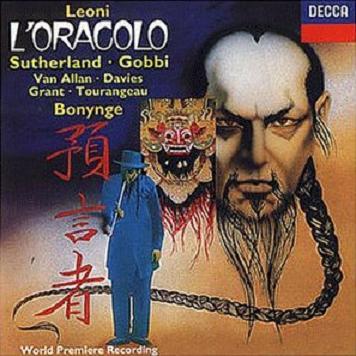 BD: What about composers you have sung; for instance, the lesser works of Giordano or Boito, or people like that. Why do we not know those so well today? Are they worth producing, or should they stay on the library shelf?
BD: What about composers you have sung; for instance, the lesser works of Giordano or Boito, or people like that. Why do we not know those so well today? Are they worth producing, or should they stay on the library shelf?
TG: I really don't understand why they are not done more often. I have been performing a lot of operas by Cilea, Giordano and others, yet they are still unknown here, or little known. Maybe there is still hope and time for them. For instance, I know L'arlesiana of Cilea. It is a lovely opera, and has beautiful music, beautiful arias to sing. And also it is dramatically important.
[Vis-à-vis the recording shown at right, see my Interviews with Sutherland and Bonynge, Richard Van Allan, and with Ryland Davies.]
BD: Have you sung some operas which do not have lovely arias, some that are very poor works?
TG: Yes, [hesitating] but I don't want to mention...
BD: [Reassuringly] No, you don't need to mention specific names...
TG: Yes. There was a moment in which [groans out of frustration]... how do we call this? The friendship between Italian and German people before the War, the government by Mussolini and Hitler, and there was a kind of exchange of new operas; some of them were not so good, really, but we performed just a couple of times to make them happy. That's all. [Both laugh] You know, a real masterpiece will never die. When things disappear from the normal repertoire, the reason is mostly because they are not known enough, or because they are not good enough.
BD: Why are they not good enough? What are they lacking?
TG: The audience didn't or doesn't accept it. They may feel that the music is maybe too much imitating some other, or maybe is too much light and there's not enough weight in this or there is no meaning; perhaps it is because they are disconnected with the story and the theme. I don't know, really, what is the reason, but there are paintings that you like and others that you don't like!
BD: But some people must like them!
TG: Oh, yes; there is always going to be some people in the audience. When you have 3,000 people in the audience, all 3,000 think in a different way! You can have 1,500 who think in one way and the others, [imitates people arguing with one another] "Oh, no..." "Yes, but I prefer..." Personal opinions are still free, thank God!
BD: What's the role of the critic?
TG: I think the role of the critic is very important because when the critic is honest and has a great knowledge of musicology, or who is a musician himself with experience and knowledge, he wants to be helpful. The critic needs to explain why he dislikes this, why this is not good, why he is making this criticism. Then it can be constructive. Then it can be a great help, because a singer can be wounded or touched by an expression of the critic. Suppose I sing and the critic says, "I didn't like it." Okay, he must tell me why he didn't like it. And if he doesn't tell me why
— perhaps because he has not enough space in the newspaper — I must realize that among the audience, there was one man who didn't like it! So I must make an examination of my conscience and see again what I'm doing! I must try to find why one person felt that way because one person is not one; with him there are ten others or one hundred others that will think that way!
BD: But you don't want to change for the one, and then lose the other 2,999, do you?
TG: No, I don't want to change! But if I was not satisfactory for this one
— who has a following of another ten or twenty or it doesn't matter how many — it means there's something in my performance was not good!
BD: Have you had occasion where you have felt you haven't given a good performance, and yet the critics say it's marvelous or it's brilliant?
TG: Yeah, sometime this happens, also; most of the time that is when I am up in the country, but I have been all my life reading and considering very much the critics, and I put the blame on myself. By impulse, sometimes I say, "Oh! This terrible man is always against me, so is that really off?" But that's the first impression. Then at home I say, "Why?" and you have to find out so you can improve. There is an Italian saying, which may be international, that in a very poor second-class book, you can find something good. So even if the critic seems he is against my way of performing or that he is in a bad temper or is simply against me, I must also find the good in what he's writing. And if you look and you find the good in there, you will find yourself improving.
BD: So even now you're still trying to improve everything?
TG: Oh, yeah! Otherwise I will be a dead man, the mummy. You have to improve to keep alive the interest in what you do. Even if you don't improve you have to imagine that you are improving and try to do it. You must dig deeper and deeper. For instance, I performed Tosca here many times, and the last time I directed it was '76, but this time I'm changing all the procession. At home, when I was asked to direct the opera here, I tried to remember... I closed my eyes and visualized what I had been doing. How was the procession? It was coming from upstage to the front, and then had to leave at the side. So now the procession will come from the center of the stage, go a little upstage, crossing the stage, and then reappearing on the left! That way all the procession is visible and the chorus is singing in front. I have learned a little more, naturally, in every year that I stay on this side of the world; you have to learn something.
BD: Now is this better, or is this just different?
TG: It is different, and is better. If it was only different I would not do it. No, because in asking everybody to change what we have done, is asking something different! So if it is only different, I will not do it. I am not a dictator; I am a very humble man when I work. The first thing is to ask my assistant and the other people here, "I have this idea; what you think? Tell me frankly." We discuss! They approve, and then we did it.
BD: So it's a communal effort, then.
TG: Yes, because two eyes can see very well; four is better.
BD: Do we get the standard operas too much? I mean, year after year we have Tosca and Traviata and a few other familiar things. Should we instead have a Giordano and a Boito and a Cilea, etc.?
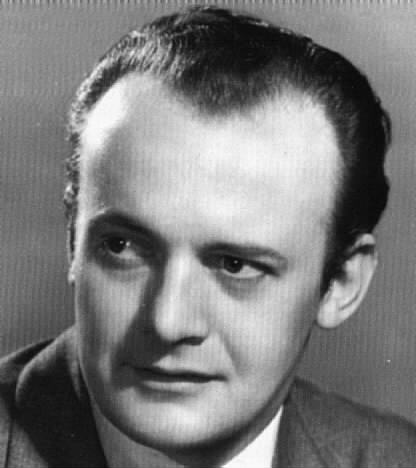 TG: Yes, I would like to, but it will be depending on the opera house. Here you have seven operas this year. If you have a theater where they perform every night for one year or ten months, then it will be really a duty for them to do more works. But I hope also here that they can find, every season, one less-known opera of good quality with a good cast. You can't kill Rigoletto even with a bad singer; it's such a great masterpiece that it will be good. It can be also much better if you have a good cast or an excellent cast, but small operas which are out of the repertory need a good personality. For instance, when I was starting out, we did L'arlesiana and we had Tito Schipa and Gianna Pederzini! Two big names was a guarantee for the success! Then maestro Serafin added Tito Gobbi, Gino Bechi, Giulio Neri in this cast, so we had the chance to start our careers with two big stars, and the opera was a success.
TG: Yes, I would like to, but it will be depending on the opera house. Here you have seven operas this year. If you have a theater where they perform every night for one year or ten months, then it will be really a duty for them to do more works. But I hope also here that they can find, every season, one less-known opera of good quality with a good cast. You can't kill Rigoletto even with a bad singer; it's such a great masterpiece that it will be good. It can be also much better if you have a good cast or an excellent cast, but small operas which are out of the repertory need a good personality. For instance, when I was starting out, we did L'arlesiana and we had Tito Schipa and Gianna Pederzini! Two big names was a guarantee for the success! Then maestro Serafin added Tito Gobbi, Gino Bechi, Giulio Neri in this cast, so we had the chance to start our careers with two big stars, and the opera was a success.
BD: Are there some operas that are good but have just not gotten the best performance, and that's why they're not remembered today?
TG: Opera which have had a bad performance are also today everywhere.
BD: For instance, we know that Traviata was a failure at first. Suppose it had never gotten another performance. Suppose it was buried and lost...
TG: Certainly there are operas which have been buried after the first flop; the opening evening was unsuccessful. Naturally a revival can maybe help them. There are opera in the drawer today that have been sleeping for half century, covered by dust and nobody had the courage to take them out! Maybe they were not of the time 50 years ago, and now they will be more accepted. But it is a quite a job, you know; you can't imagine how many operas have been written all over the world in the last 200 years!
BD: Oh, thousands.
TG: I think a million! [Laughter all around]
BD: The public's taste is constantly changing?
TG: Oh, yes! Oh, yes.
BD: Is the public's taste always right?
TG: They have the right to change and to be up to date because we perform for them, not for what they are supposed to be 20 years ago! We perform for the people who are here today, so we have to adapt our performance, our acting, our interpretation, to the audience of today. The audience changes; they have the right to change. Now they come in blue jeans, which I don't like very much. I think opera must be a kind of temple, and you have to respect a little bit also in the way you dress.
BD: But wouldn't you rather have the kids come in blue jeans than not come at all?
TG: Oh, yes. Certainly... also naked if they want. [More laughter] The young people are the new forces, the new generation. In fact, I suggested to Carol Fox about 20 years ago or maybe more, to have the dress rehearsal open for one dollar, or even for a quarter, to the students! She did it a little later, and now all the opera houses are opening the dress rehearsal to for the young students, for the people of the young generation! Not the full theater, but just a portion. They can pay today half a dollar, and maybe tomorrow they can be also helping the opera to a better living.
BD: How do we get more young people to come to the opera? Is this one of the ways?
TG: They come. They come. You just open the door. They come. The young generation is the generation who carry a radio in the street when they walk. They have a radio in the school, they have a radio while they study; they love music because they are the people who put the music around us. So if you tell them there is opera, it doesn't matter what
—Traviata or Tosca or Butterfly — any opera, they will come. And there is an enormous improvement in this, all over the world. In Italy I saw, with enormous pleasure, that one of the last performances I went to, two thirds of the audience was young people from 16 to 25. Music is a need for the human being. We need music. It's good to be able to choose what kind of music you need.
BD: Right. My question is how do you get them to choose opera instead of rock and roll?
TG: Let them try; let them taste! How can they choose macaroni for Rice-A-Roni? [Laughter] You have to taste both of them and then they will make their choice. Somebody will like more rock and roll, and somebody will like more Traviata or old-fashioned music.
BD: Does opera on the television help this?
TG: Yes and no, because if you know the opera, if you are an operagoer, if you know something about music and opera, you can listen with a certain pleasure and watch the opera broadcast on television because you know exactly what is going on, and because you listen with your brain more than with your ear. You look more with your brain than with your eyes! Because you know the opera, you want to see what you want to see, not what they offer you. Really. Sometimes, a genuine innocent creature, who has no knowledge at all, turns on the television and there is a performance of something that he can't understand
— people singing in a funny way and acting with strange movements. This person will be disappointed. You have to tell them what the style is about; you have to teach them, to help them. This television opera, the opera broadcast by television is a great pleasure, a great help, a great joy of music for the people who already know about it, but I don't think is the hook that can fish the young generation.
BD: So it develops what's there, but it doesn't start things anew.
TG: Yeah. If you really clean your brain for a moment and look at them, they say, "What is this? I prefer the western shooting and horses running." Opera is not a thing that you enjoy very much if you don't know it.
BD: Does the running translation at the bottom of the screen bother you? [Note: Remember, this interview took place in the fall of 1982. Titles in the theater were introduced a few months later.]
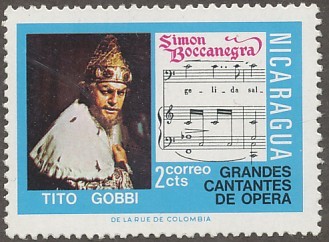 TG: [With flat disapproval] Terrible.
TG: [With flat disapproval] Terrible.
BD: You don't like that at all?
TG: That's terrible. You must go prepared. If you come to the opera house to see Traviata, Tosca, Simon Boccanegra, Trovatore
— it doesn't matter — you have to know exactly. There is this beautiful booklet they sell or give you. Read it!! On the television, I prefer a speaker before the performance who tells in five minutes the story. He tells you what it is about, and then it can be educational. But if you spend your time to read, and follow with the eyes this running characters, you don't see the screen and you don't see what is going on! And if you don't listen — as it happened to me at the first performance when I was watching the decor and the scenery, the curtain come down before I enjoyed the music.
BD: Thank you for everything that you have given to opera.
TG: Thank you. I am very proud for what I was able to give to the world of opera, and I thank God for allowing me to do so, because it's a gift.
BD: You've given so generously, and you've given so much to Chicago; thank you for coming here so often.
TG: I love Chicago. Chicago's a beautiful city, and I saw Chicago growing. Years ago, when it was a little difficult moment for the Lyric and the opera house, I came here and made a famous speech. They asked me to do this important speech for people. I say they are building skyscrapers, beautiful buildings of cement and marble and iron and glasses, but remember Chicago without an opera will be a mutilated city. You can't live without music. "Panem et circenses," the Latin phrase, "Bread and enjoyment," the art and music.
Tito Gobbi at Lyric Opera of Chicago
1954 - Barber of Seville (Figaro) with Simionato,Simoneau, Badioli, Rossi-Lemeni; Rescigno
Traviata (Germont) with Callas, Simoneau, Lind, Foldi; Rescigno
Tosca (Scarpia) with Steber, di Stefano, Badioli, Foldi, Stewart (Angelotti),William Mason (Shepherd Boy); Rescigno
1955 - Aïda (Amonasro) with Tebaldi, Antonioli, Varnay, Wildermann; Serafin
Bohème (Marcello) with Tebaldi, di Stefano, Lind, Rossi-Lemeni, Foldi; Serafin
Rigoletto (Rigoletto) with Stich-Randall, Björling, Wildermann, Dunn, Krainik (Giovanna); Rescigno
Tabarro (Michele) with Ribla, Bergonzi, Wildermann, Turner, Krainik (Lover); Rescigno
Ballo in Maschera (Renato) with Cerquetti, Björling, Turner, Foldi, Wildermann; Rescigno
1956 - (Opening Night) Fanciulla del West (Jack Rance) with Steber, Del Monaco; Mitropoulos
Andrea Chénier (Carlo Gérard) with Steber, Del Monaco, Lind; Buckley
Tosca (Scarpia) with Tebaldi, Björling, Badioli, William Mason (Shepherd Boy); Bartoletti/Kopp
1957 - (Opening Night) Otello(Iago) with Del Monaco, Tebaldi/Koehn, Chabay, Kramarich, Wildermann; Serafin
Pagliacci (Tonio, but not the Prologue) with Likova, Del Monaco, MacNeil, Caruso; Bartoletti; Rosing
Andrea Chénier (Carlo Gérard) with Tebaldi, Del Monaco, Krainik (Countess); Gavazzeni
Marriage of Figaro (Count) with Steber,Berry, Moffo, Simionato, Badioli; Solti
Adriana Lecourveur (Michonnet) with Tebaldi, di Stefano, Simionato, Badioli, Krainik (Mlle. Dangeville); Serafin
Tosca (Scarpia) with Steber, di Stefano/Björling, Badioli, William Mason (Shepherd Boy); Bartoletti
Don Carlo (Rodrigo) with Cerquetti, Sullivan/Björling, Christoff, Rankin, Wildermann; Solti
1958 - (Opening Night) Falstaff (Falstaff) with Tebaldi, Simionato, Canali, Moffo, MacNeil; Serafin
Gianni Schicchi (Schicchi) with Moffo, Misciano, Wildermann, Canali; Serafin
Pagliacci (Tonio) with Likova, di Stefano, MacNeil, Caruso; Serafin
Barber of Seville (Figaro) with Simionato, Misciano, Corena, Montarsolo, Canali; Schaenen
Rigoletto (Rigoletto) with Moffo, Björling, Wildermann, Steffan, Krainik (Giovanna); Sebastian
Aïda (Amonasro) with Rysanek, Björling, Simionato, Wildermann; Sebastian
1959 - Simon Boccanegro (Boccanegra) with Roberti, Tucker, Mazzoli, Maero, Krainik (Servant); Gavazzeni
Ballo in Maschera (Renato) with Nilsson, di Stefano, Kramarich, Stahlman; Bartoletti
1960 - (Opening NIght) Don Carlo (Rodrigo) with Roberti, Tucker, Christoff, Simionato, Mazzoli; Votto
Tosca (Scarpia) with Tebaldi, di Stefano, Pechner; Gavazzeni
Fedora (De Siriex) with Tebaldi, de Stefano, Scovotti; Matačič
Simon Boccanegra (Boccanegra) with Tebaldi, Tucker, Mazzoli, Cesari; Gavazzeni
1962 - Tosca (Scarpia) with Crespin, Zampieri, Corena;Cillario
Marriage of Figaro (Count) with Della Casa, Capecchi, Streich,Berganza, Corena; Maag
1963 - (Opening Night) Nabucco(Nabucco) with Mastilovic, Lo Morena, Christoff, Wildermann, Cossutta (Abdallo); Bartoletti
Otello (Iago) with Jurinac, Vickers/Uzunov, Vozza, Cossutta (Cassio), Wildermann; Bartoletti
1964 - Don Carlo (Rogrigo) with Gencer, Tucker, Ghiaurov,Cossotto/Bumbry, Marangoni; Bartoletti
Tosca (Scarpia) with Crespin, Tucker, Tadeo; Bartoletti
1965 - Simon Boccanegra (Boccanegra and Director) with Ligabue, Cioni, Ariè, Cesari; Bartoletti
1966 - Otello (Iago and Director) with Kabaivanska, Vickers/Craig, Roggero/Cvejic, Lorenzi, Wildermann; Sanzogno
1968 - Falstaff (Falstaff and Director) with Kabaivansak, Malagù, Dominguez, Mittelmann, Garaventa, Andreolli; Sanzogno, Zeffirelli (Production)
1969 - Don Giovanni (Giovanni and Director) with Watson, Ligabue, Evans, Kraus/Garaventa, Raskin;Leitner
Barber of Seville (Director) with Horne, Bruscantini, Garaventa, Evans, Vinco; Pritchard
1970 - Gianni Schicchi (Schicchi and Director) with Marimpietri, Garaventa, Washington, Andreolli; Bartoletti
1971 - Tosca (Scarpia and Director) with Martin/Kubiak, Bergonzi, Tajo, Giorgetti; Sanzogno
Barber of Seville (Director) with Horne,Prey, Garaventa, Malas, Ferrin, Zilio; Bartoletti
1972 - Ballo in Maschera (Director) with Arroyo, Tagliavini,Milnes, Baldani, Kozut, Ferrin, Voketaitis; Dohnányi
1973 - Tosca (Scarpia and Director) with Kubiak, Tagliavini, Tajo, Giorgetti; Bartoletti
1976 - Ballo in Maschera (Director) with Ricciarelli, Carreras, Bruson, Wolff, Wise, Casarini, Voketaitis; López-Cobos
Tosca (Director) with Neblett, Pavarotti, MacNeil, Tajo, Giorgetti; López-Cobos
1977 - Maria Callas Tribute (Speaker) with Neblett, Kuhlmann, Vickers, Little,Stilwell; Fox, Ross; Bartoletti, Fournet
Barber of Seville (Director) with Ewing, Stilwell, Alva, Desderi, Montarsolo, Hines; Bellugi
1979 - Andrea Chénier(Director) with Marton, Domingo, Bruson, Kuhlmann, Voketaitis, Gordon; Bartoletti
1982 - Tosca (Director) with Bumbry/Marton, Luchetti/Domingo, Wixell/Nimsgern, Tajo, Kavrakos,Cook; Rudel
-- Names which are links refer to my interviews elsewhere on this website.
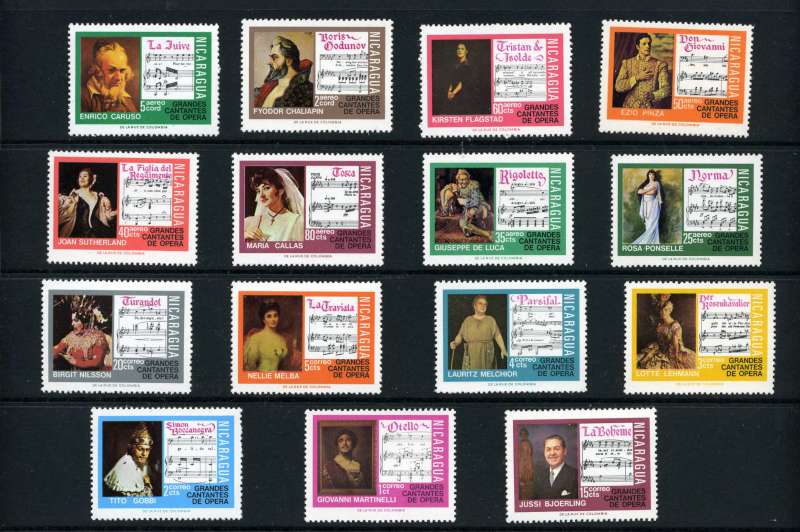
[This is the full set of stamps issued by Nicaragua in 1975 to honor opera singers. Gobbi is in excellent company!]
© 1982 Bruce Duffie
This interview was held in a dressing room backstage in the Civic Opera House in Chicago, on October 7, 1982. A small portion was included in an article I wrote for the WNIB Program Guide one year later. Portions were used (along with recordings) on WNIB the following year, and again in 1987, 1988, 1993, 1997, 1998 and 2000. The transcription was made and posted on this website in 2011.
To see a full list (with links) of interviews which have been transcribed and posted on this website,click here.
Award - winning broadcaster Bruce Duffie was with WNIB, Classical 97 in Chicago from 1975 until its final moment as a classical station in February of 2001. His interviews have also appeared in various magazines and journals since 1980, and he now continues his broadcast series on WNUR-FM, as well as on Contemporary Classical Internet Radio.
You are invited to visit his website for more information about his work, including selected transcripts of other interviews, plus a full list of his guests. He would also like to call your attention to the photos and information about his grandfather, who was a pioneer in the automotive field more than a century ago. You may also send him E-Mail with comments, questions and suggestions.